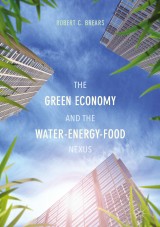Details

The Green Economy and the Water-Energy-Food Nexus
|
96,29 € |
|
| Verlag: | Palgrave Macmillan |
| Format: | |
| Veröffentl.: | 18.08.2017 |
| ISBN/EAN: | 9781137583659 |
| Sprache: | englisch |
Dieses eBook enthält ein Wasserzeichen.
Beschreibungen
<div><div>This book argues that a variety of policies will be required to create synergies between the water-energy-food nexus sectors while reducing trade-offs in the development of a green economy. Despite rising demand for water, energy and food globally, the governance of water-energy-food sectors has generally remained separate with limited attention placed on the interactions that exist between them. </div><div><br/></div><div>Brears provides readers with a series of in-depth case studies of leading cities, states, nations and regions of differing climates, lifestyles and income-levels from around the world that have implemented a variety of policy innovations to reduce water-energy-food nexus pressures and achieve green growth. </div><div><br/></div><div><i>The Green Economy and the Water-Energy-Food Nexus</i> will be of interest to town and regional planners, resource conservation managers, policymakers, international companies and organisations interested in reducing water-energy-food nexus pressures, environmental NGOs, researchers, graduate and undergraduate students.</div></div><div><br/></div>
1. introduction.- 2. The Green Economy.- 3. The Green Economy and Sustainable Development.- 4. Policy Tools to Reduce Water-Energy-Food Nexus Pressure.- 5. The Green Economy and the Water-Energy-Food Nexus in New York City.- 6. The Green Economy and the Water-Energy-Food Nexus in Singapore.- 7. The Green Economy and the Water-Energy-Food Nexus in Massachusetts.- 8. The Green Economy and the Water-Energy-Food Nexus in Ontario.- 9. The Green Economy and the Water-Energy-Food Nexus in Denmark.- 10. The Green Economy and the Water-Energy-Food Nexus in Korea.- 11. The Green Economy and the Water-Energy-Food Nexus in the Colorado River Basin.- 12. The Green Economy and the Water-Energy-Food Nexus in the Murray-Darling River.- 13. The Green Economy and the Water-Energy-Food Nexus in the Rhine River Basin.- 14. Best Practices.- 15. Conclusions.
<div><b>Robert C. Brears</b> is the founder of Mitidaption, Mark and Focus, and is Director on the International Board of the Indo Global Chamber of Commerce, Industries and Agriculture.<br/></div>
<div><div>This book argues that a variety of policies will be required to create synergies between the water-energy-food nexus sectors while reducing trade-offs in the development of a green economy. Despite rising demand for water, energy and food globally, the governance of water-energy-food sectors has generally remained separate with limited attention placed on the interactions that exist between them. </div><div><br/></div><div>Brears provides readers with a series of in-depth case studies of leading cities, states, nations and regions of differing climates, lifestyles and income-levels from around the world that have implemented a variety of policy innovations to reduce water-energy-food nexus pressures and achieve green growth. </div><div><br/></div><div><i>The Green Economy and the Water-Energy-Food Nexus</i> will be of interest to town and regional planners, resource conservation managers, policymakers, international companies and organisations interested in reducing water-energy-food nexus pressures, environmental NGOs, researchers, graduate and undergraduate students.</div></div><div><br/></div>
Presents a series of case studies that illustrate how cities, states, nations and regions of differing climates, lifestyles and income-levels have implemented policies to reduce water-energy-food nexus pressures Discusses the components of the food-water-energy nexus and the pressures it faces from rapid economic growth and climate change Provides a review of the various fiscal and non-fiscal tools available for reducing the global demand on the water, energy and food sectors
Presents a series of case studies that illustrate how cities, states, nations and regions of differing climates, lifestyles and income-levels have implemented policies to reduce water-energy-food nexus pressures<br/><br/><div>Discusses the components of the food-water-energy nexus and the pressures it faces from rapid economic growth and climate change<br/><br/><div>Provides a review of the various fiscal and non-fiscal tools available for reducing the global demand on the water, energy and food sectors</div></div>
Diese Produkte könnten Sie auch interessieren:

Decision Support Systems for Risk-Based Management of Contaminated Sites

von: Antonio Marcomini, Glenn Walter Suter II, Andrea Critto

96,29 €

Dynamics of Mercury Pollution on Regional and Global Scales

von: Nicola Pirrone, Kathryn R. Mahaffey

149,79 €














